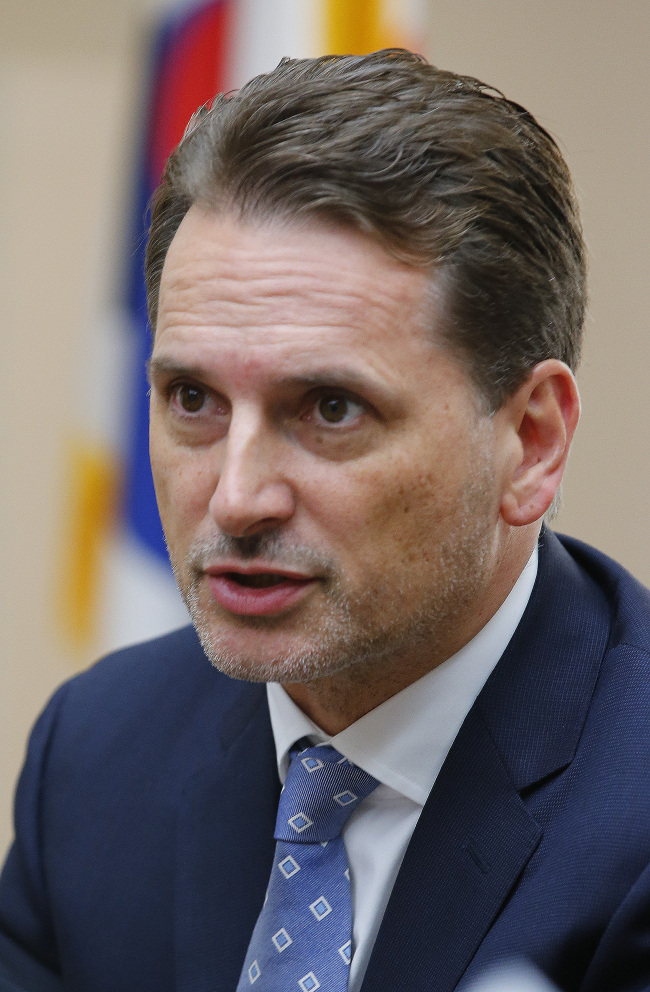Korea’s rise from the rubble of the 1950-53 Korean War is a “message of hope” for Palestinian refugees in the war-ravaged region, the chief of a U.N. relief agency supporting them said Thursday, expressing hopes for a deeper cooperation between Seoul and his agency.

“Think of what has happened since the 1950s. You can think of big milestones of the history of your country,” Pierre Krahenbuhl, commissioner general of the U.N. Relief and Works Agency for Palestine Refugees in the Near East, said in a meeting with Korean reporters in Seoul.
“What you have achieved is a very strong message. Things are possible when the political environment, economic environment and human environment improve, and things change fundamentally,” he added, noting the abject situations of Palestinians suffering from “exclusions, humiliation and lack of the freedom of movement.”
Following his visit to Tokyo, Krahenbuhl came here to meet with senior Seoul officials including Vice Foreign Minister Cho Tae-yul and Korean International Cooperation Agency president Kim Young-mok to further strengthen the partnership between Seoul authorities and the agency.
This year, Seoul, which has engaged in the support for innovation in the information and technology area in the conflict-laden region, has donated some $1.8 million to UNRWA activities.
The organization spends between $1.2 billion and $1.3 billion a year. The U.S. is the single largest financial donor with a yearly contribution of around $380 million, followed by the EU and Saudi Arabia with around $100 million each.
Established in December 1949 after the end of World War II in 1945, the 30,000-staff UNRWA is currently providing support for some 5 million Palestinians living in the Gaza Strip, the West Bank, Jordan, Syria and Lebanon. The agency offers assistance in the fields of education, health care, social services and relief assistance in the war-devastated zones.
Above all, the most crucial area that UNRWA has engaged in is education, the commission general said, calling it the “only factor of hope” for the refugees.
The organization currently runs 700 schools in the Middle East to provide nine years of education to some 500,000 Palestinian refugees ages 6-16.
“In a situation where the Middle East is filled with conflicts, risks of further radicalization, problems of opportunities and threats, and risks of displacement, education is, in a way, the only factor of hope in the lives of hundreds of thousands of young Palestinians for a better future,” he said.
While talking of the importance of education, Krahenbuhl introduced a poem about hope, which was in a notebook found in a Gaza-based war-torn UNRWA school last year. The poem was handwritten by Rua Kheidh, a 13-year-old Palestinian girl who survived the armed conflict.
The poem reads, “Hope is a friend that never betrays you. It may leave you for a while, but always comes back. One should not look for happiness in the neighbor’s garden. One should always look for happiness in one’s own garden.”
After reading it out to reporters, the UNRWA chief said, “I promised that her notebook would travel around the world to convey her message. So we are very much looking forward to strengthening our relationship with Korea further in order to allow young girls like Rua to continue to study.”
Asked to offer his views on the North Korean refugee crisis, he said that what he can relate to is the experience of refugees, though his agency’s mandate is clearly focused on the refugee issues in the Middle East.
“I think if you think of what it means to be a refugee, it means to have fled your home, have abandoned most things that are important to you in your life. It means to have made a split set of decisions about where to go and where to stay,” he said.
“I think what people have to understand is you cannot neglect such a community.”
By Song Sang-ho (sshluck@heraldcorp.com)







![[KH Explains] Hyundai's full hybrid edge to pay off amid slow transition to pure EVs](http://res.heraldm.com/phpwas/restmb_idxmake.php?idx=644&simg=/content/image/2024/04/18/20240418050645_0.jpg&u=20240419100350)






![[From the Scene] Monks, Buddhists hail return of remains of Buddhas](http://res.heraldm.com/phpwas/restmb_idxmake.php?idx=652&simg=/content/image/2024/04/19/20240419050617_0.jpg&u=20240419175937)

![[KH Explains] Hyundai's full hybrid edge to pay off amid slow transition to pure EVs](http://res.heraldm.com/phpwas/restmb_idxmake.php?idx=652&simg=/content/image/2024/04/18/20240418050645_0.jpg&u=20240419100350)

![[Today’s K-pop] Illit drops debut single remix](http://res.heraldm.com/phpwas/restmb_idxmake.php?idx=642&simg=/content/image/2024/04/19/20240419050612_0.jpg&u=)